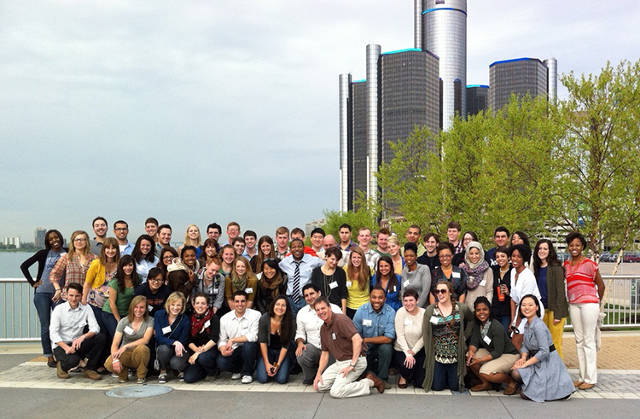Jason Zogg lives on the 21st floor of a Mies van der Rohe apartment building in Lafayette Park, one of Detroit’s best neighborhoods. He pays $800 a month in rent and has a free parking space.
It’s one of the benefits of living somewhere other people don’t want to be. The equivalent rental inManhattan would be well in excess of $3,000. And Zogg could forget about keeping a vehicle.
It’s not the only benefit of being in Detroit at the moment. Though the city just filed the biggest municipal bankruptcy in history, its decline is opening up opportunities. Zogg, an urban planner who has a consulting job with a local utility, is currently refurbishing a big art deco building, re-purposing a parking lot into a park, and conceiving a master-plan for the neighborhood where he works. He’s only 28.

“I came here from the East Coast, because as an urban planner, I’m interested in opportunity,” he says. “When I saw Detroit, I saw a huge amount of opportunity, almost a blank slate. I felt I could make a difference; that this was the place to be, and this was the time to be here.”
That Zogg saw Detroit at all is down to Challenge Detroit, a program that’s working to attract professionals back to the city. Over the last year, it has hosted 30 “fellows”–both recent graduates, and people like Zogg, who have a few years’ work experience. The twentysomethings have spent four days a week with local employers; then, on Fridays, they’ve collaborated on social problems, working with local nonprofits.
They tackled nine challenges in all, covering areas like education, food access, and entrepreneurship. For example, they worked with Beaumont Health System to develop a new health and fitness curriculum for Detroit’s kids (see video above). They convened teachers from public, private, and charter schools to create a new and easier-to-use enrollment system. And they hooked up with an incubator, called Techtown Detroit, to identify ways of encouraging more startups to come to Detroit (and hopefully employ more locals).
Zogg reckons there’s a certain cachet in being part of a resurgence. Google, Facebook, and Twitter have already set up offices in the city. One friend of his recently moved to Detroit, and secured funding for a startup, having failed to find backers in California. “Even though it was the same business plan, they were able to get money, because Detroit is now so cool and interesting,” he says.
Zogg likes the Midwest so much that he’s planning to stay, even though the program is over and another Challenge cohort is arriving. He believes that most of his group will remain in the city, because prospects are better than in other places.
“I’ve lived in New York, and D.C., and Boston. The barriers to entry there are hard to overcome, with the amount of college debt Millennials have, the incomes we’re making, and starting our careers in the middle of the recession,” he says. “You can have a life in Detroit and be part of a group of people who are committed to see the city become something great again.”
